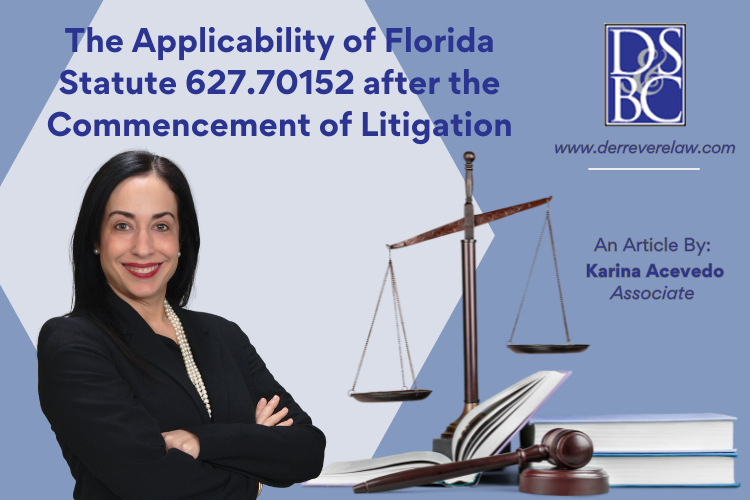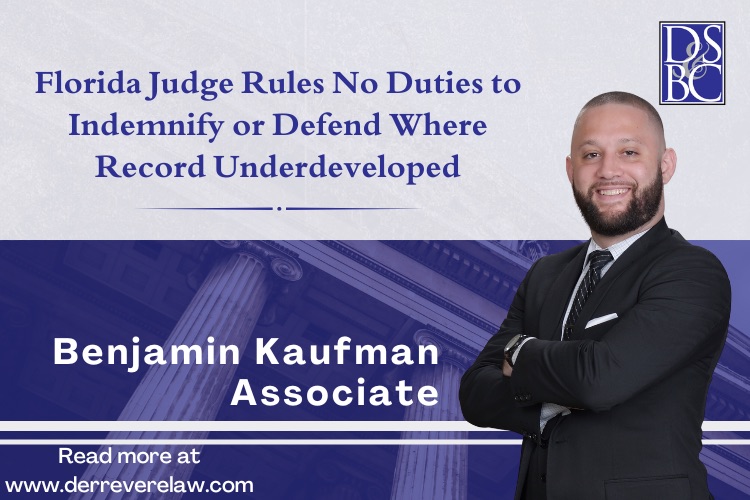The Applicability of Florida Statute 627.70152 after the Commencement of Litigation

In a recent hearing held on Defendant’s Motion for Entry Upon Land to allow for a re-inspection for an engineer by the Insurer, Plaintiff’s counsel argued that based on Florida Statute 627.70152(4)(a)(3), the Insurer waived its right to re-inspect the Insured’s property and due to this, said Motion should be denied. The Judge in this case failed to apply Florida Statute 627.70152(4)(a)(3) correctly and agreed with Plaintiff’s counsel’s interpretation of the statute and denied Defendant’s Motion for Entry Upon Land.
This article looks at Florida Statute 627.70152(4)(a)(3) and how it does not apply once a case is in the litigation phase. Florida Statute 627.70152(4)(a)(3) states the following:
4) INSURER DUTIES. — An insurer must have a procedure for the prompt investigation, review, and evaluation of the dispute stated in the notice and must investigate each claim contained in the notice in accordance with the Florida Insurance Code. An insurer must respond in writing within 10 business days after receiving the notice specified in subsection (3). The insurer must provide the response to the claimant by e-mail if the insured has designated an e-mail address in the notice.
(a) If an insurer is responding to a notice served on the insurer following a denial of coverage by the insurer, the insurer must respond by:
- Accepting coverage;
- Continuing to deny coverage; or
- Asserting the right to reinspect the damaged property. If the insurer responds by asserting the right to reinspect the damaged property, it has 14 business days after the response asserting that right to reinspect the property and accept or continue to deny coverage. The time limits provided in s. 95.11 are tolled during the reinspection period if such time limits expire before the end of the reinspection period. If the insurer continues to deny coverage, the claimant may file suit without providing additional notice to the insurer.
Pursuant to the statute, if the Insurer asserts the right to re-inspect the property, it has fourteen (14) days to do so otherwise it can be deemed as waived. At the hearing, Plaintiff’s counsel used this argument, but in the litigation phase, and stated that the Insurer waived its right to re-inspect by not asserting its right in the response to the Plaintiff’s Notice of Intent to Litigate prior to Plaintiff filing suit. Plaintiff’s counsel went further and argued that although the Insurer waived its right to re-inspect the property, the Insurer is not precluded from having an engineer provide its opinion by reviewing Insured’s documents and/or photographs of the alleged damages and property. Under Plaintiff’s argument, the Insurer would have to assert its right for re-inspection in all of its responses to the Notice of Intent to Litigate filed by the Insured, which would be unnecessary and/or reasonable since not all claims require a re-inspection and because issues that necessitate a re-inspection by an engineer may arise after a suit is filed and discovery is propounded and received.
Plaintiff’s counsel’s application of the statute is erroneous in that this Statute delineates the requirements and procedures for re-inspection prior to filing suit and not after the suit is filed. More importantly, if Plaintiff’s argument were valid, the Florida statute would be in direct conflict with Florida Rule of Civil Procedure 1.280, which discusses the general provisions governing discovery in Florida. Florida Rule of Civil Procedure 1.280 provides for discovery by various methods, including permission to enter upon land. For these reasons, the Judge failed to properly apply the statute and the basic rules of civil procedure, and this pre-suit statute should not be used to preclude the Insurer’s ability to re-inspect a property once a claim is in litigation.




